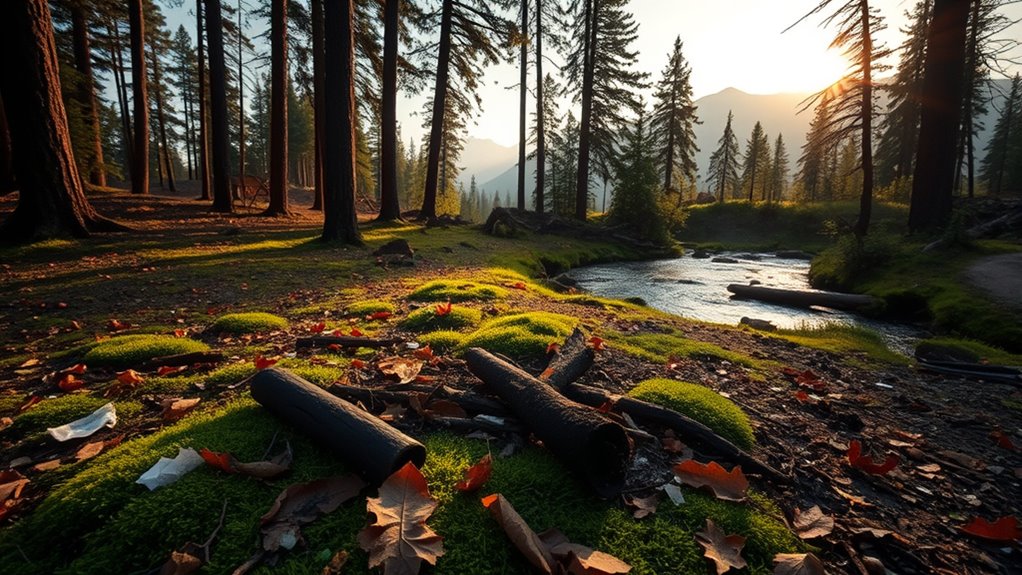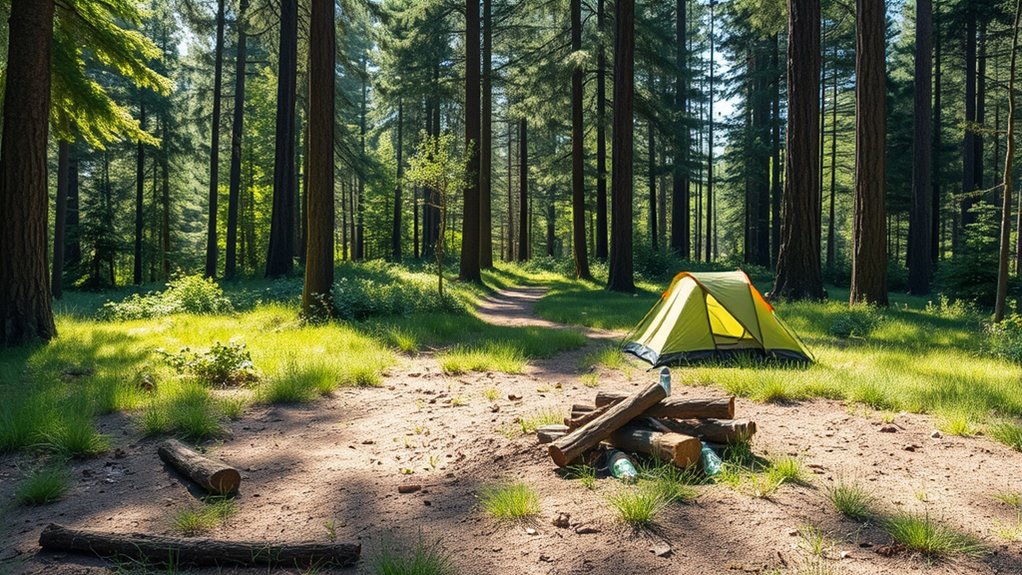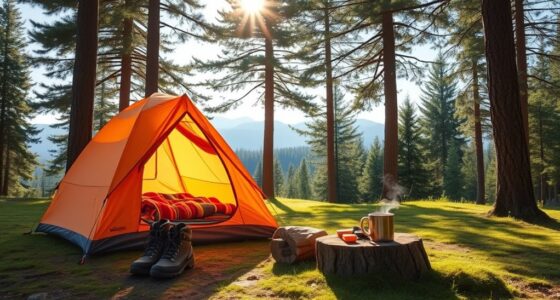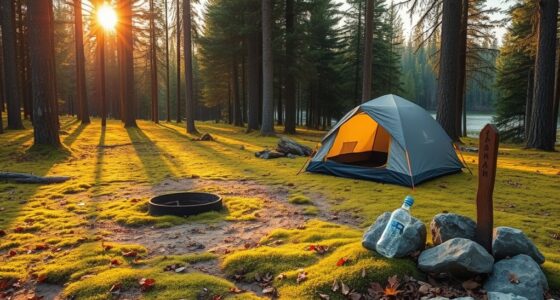Understanding your environmental footprint while camping is essential for eco-conscious outdoor recreation. Your choices, from where you set up camp to how you manage waste, directly impact ecosystems and wildlife. By adopting principles like Leave No Trace, using sustainable gear, and respecting natural habitats, you minimize ecological harm. Small, mindful actions safeguard ecosystems for future generations. If you continue exploring, you’ll discover practical ways to balance enjoyment with environmental responsibility.
Key Takeaways
- Camping can disturb ecosystems, soil, and vegetation if not practiced responsibly.
- Using eco-friendly gear and minimizing waste reduces environmental footprint.
- Staying on designated trails prevents soil erosion and protects native plants.
- Proper waste disposal, including packing out trash, preserves natural habitats.
- Respecting wildlife and fire regulations helps maintain ecological balance.

Have you ever considered how your camping trip impacts the environment? Every choice you make—from where you pitch your tent to how you dispose of waste—contributes to your overall ecological footprint. Recognizing this influence is the first step toward more responsible outdoor recreation. Adopting principles like Leave No Trace and integrating sustainable practices isn’t just about minimizing damage; it’s about actively preserving the natural spaces that draw us outdoors. These approaches serve as ethical frameworks that guide your behavior, ensuring you leave ecosystems intact and healthy for future generations.
Your outdoor choices shape the environment—practice Leave No Trace to protect our natural world.
Implementing Leave No Trace principles requires deliberate actions. For instance, you should plan ahead to avoid overburdening the environment with excessive waste or resource use. When you set up camp, select durable surfaces that can withstand foot traffic without degradation, such as established campsites or flat rocks. If you need to use fire, ensure it’s in designated areas and extinguish it completely to prevent wildfires. Pack out all trash, leftover food, and biodegradable waste, recognizing that even seemingly harmless items can disrupt local flora and fauna. These practices are rooted in the understanding that minimal impact is essential for ecological balance.
Sustainable practices extend beyond immediate campsite behavior. Using eco-friendly gear—such as biodegradable soaps, rechargeable headlamps, and reusable containers—reduces your environmental footprint. Prioritize products that are made ethically and with minimal environmental impact, and avoid single-use plastics that can persist in ecosystems for decades. Water conservation is also critical; by using minimal water and avoiding contamination of natural sources, you help protect essential freshwater ecosystems. Additionally, understanding sound design principles can help you appreciate the natural acoustics and silence of pristine environments, fostering a deeper connection to the wilderness. These choices reflect an awareness that conservation isn’t just about big actions but also about small, consistent decisions that cumulatively lessen environmental harm.
Furthermore, educating yourself about local ecosystems and respecting wildlife helps you minimize disturbances. Keep a safe distance from animals and avoid feeding them, which can alter their natural behaviors and diets. Staying on established trails prevents soil erosion and protects plant life. Supporting conservation efforts and choosing eco-conscious tour operators or parks that prioritize environmental stewardship amplifies your positive impact. In essence, your commitment to sustainable practices transforms the act of camping from a potentially harmful activity into a meaningful contribution to ecological preservation.
Ultimately, understanding your footprint involves a mindset shift—viewing outdoor recreation through an eco-conscious lens. By embracing Leave No Trace principles and practicing sustainability, you ensure that the wilderness remains resilient and vibrant. Your awareness and actions can serve as a model for others, fostering a collective effort to protect the environment while still enjoying the natural world. This balanced approach allows you to connect deeply with nature, knowing that your presence supports its health rather than diminishes it.
Frequently Asked Questions
How Can I Minimize Noise Pollution While Camping?
To minimize noise pollution while camping, you should adhere to campsite etiquette by keeping noise levels low, especially during quiet hours. Choose a campsite away from others if possible, and avoid loud conversations or music. Use outdoor voices sparingly, and be mindful of your surroundings. This approach reduces campground noise, fosters respect for fellow campers, and helps preserve the natural environment, ensuring everyone enjoys a peaceful, eco-conscious outdoor experience.
What Are Eco-Friendly Alternatives to Traditional Camping Gear?
Like Thoreau’s call for simplicity, opt for eco-friendly camping gear that minimizes your impact. Choose solar gear to harness renewable energy and reduce reliance on batteries or generators. Use reusable containers instead of single-use plastics, cutting waste and pollution. These alternatives promote sustainability, align with eco-conscious values, and lessen your footprint. By making mindful choices, you actively contribute to conserving nature’s serenity for future generations.
How Does Camping Affect Local Wildlife Habitats?
Camping can disturb local wildlife habitats and cause wildlife disturbance if you’re not careful. Your presence may scare animals, disrupt nesting sites, and damage delicate ecosystems. To promote habitat preservation, stick to designated camping areas, minimize noise, and avoid trampling vegetation. Being mindful of these practices helps protect wildlife and ensures that natural habitats remain healthy and resilient for future generations to enjoy, maintaining ecological balance.
Are Biodegradable Products Truly Environmentally Safe?
Biodegradable plastics and compostable packaging are generally safer for the environment, but they aren’t entirely risk-free. They break down faster than traditional plastics, reducing long-term pollution, but require specific conditions like industrial composting facilities. If you don’t dispose of them properly, they can still harm wildlife and ecosystems. You should always prioritize eco-conscious choices, ensuring these products are certified and properly composted to minimize your footprint.
How Can I Reduce Water Usage During Camping Trips?
Think of your water use as a delicate dance—every step counts. To reduce water usage during camping, practice water-saving techniques like using minimal water for washing, reusing greywater for flushing, and opting for portable filters over bottled water. Focus on campsite water conservation by collecting rainwater and avoiding unnecessary showers. These eco-conscious strategies help protect precious water resources, ensuring your trip remains sustainable while minimizing your environmental footprint.
Conclusion
By choosing mindful camping, you become a steward of the Earth’s fragile tapestry. Your actions, like gentle ripples on a still lake, influence the environment’s delicate balance. Every footprint leaves an imprint—either one of respect or neglect. Embrace sustainable practices as your compass, guiding you toward harmony with nature. In doing so, you protect the wilderness’s silent symphony, ensuring it endures for future generations to cherish and learn from, just as you have learned from your own journey.










